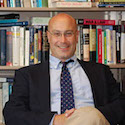Conservatives and the Constitution: Fall 2017 Book Conference
01/01/1970
In providing an overview of the topic of conversation for the November 2 and 3 conference-slash-workshop at the Kinder Institute, Boston College Professor of Political Science Ken Kersch began by noting that focusing too intently on the time frame covered by his new book, from Brown v. Board (1954) through the 1980 election of Ronald Reagan, might be a bit misleading, given that there is little discussion of Supreme Court judicial opinions in his work, and even less discussion of Reagan.
Instead, Prof. Kersch explained, the guiding principle for his manuscript, currently titled Conservatives and the Constitution: The Troubled Odyssey of the Modern American Right, is to explore conservative ideas about the Constitution as they “lived in” popular politics during the era and were shaped by and filtered through intermediary cultural institutions including mass market publications like Reader’s Digest; radio programs like Notre Dame Law School Dean Clarence Manion’s Manion Forum; and the personalities of movement luminaries like Barry Goldwater. As he went on to describe, the diversity of sources that his book plumbs—not only in number and genre but also in rhetoric and agenda—is necessary if one is to adequately convey how the period in question can be seen, alternately, as a time when the American conservative movement was “wandering in the wilderness” or as one in which what constituted conservative identity and thought was rapidly evolving through exchanges of ideas across and within multiple ideological boundaries.
On one hand, capturing the full scope of these inter- and intra-group exchanges is a daunting task, given the sheer number of branches of the conservative movement that existed and/or were under development in the 1950s, 60s, and 70s. On the other hand, though, this thicket of opinion presents a methodological opportunity to be more discursive in approach and show how, even in disagreement, these sub-divisions of American conservatism were in a near constant process of bonding over the formation of a common project. As Prof. Kersch noted in drawing his introduction to a close, it is only in attending to the various acts of bridging that were taking place during this era that we can begin to close present day knowledge gaps about conservatism, such as a lack of understanding of the ideological lineage of comments like those made recently by White House Chief of Staff John Kelly regarding the Civil War being caused by a failure of compromise; or a reductive tendency to define conservatism by synecdoche—as “all neo-Confederate,” “all Ayn Rand,” or “all Cato Institute”—and, in doing so, erase its history.
Following Prof. Kersch’s opening remarks, a trio of panels convened, two on Thursday evening and another on Friday morning, so early readers of the manuscript could comment on it. For the first panel, on “Theories of Constitutional Interpretation & Stories about Constitutional Development,” Yale University Knight Professor of Constitutional Law and the First Amendment Jack M. Balkin and Princeton University William Nelson Cromwell Professor of Politics Keith E. Whittington discussed questions related to the congealing of the movement in the 1980s, such as: who got left out of this process, how did historical memory lead to surprise bonds being formed, how were liberal and progressive ideas appropriated and re-oriented, and at what point did the intellectual debate shrink and give us the finely-tuned policy machine that we see today. The second panel, which featured Kinder Institute Associate Professor Carli Conklin, Kinder Postdoctoral Fellow David Golemboski, and independent scholar Richard Izquierdo, tackled issues of “Constitutional Designs & Structures,” while the third panel on “Civil Rights & Civil Liberties,” composed of Kinder Institute Associate Professor Adam Seagrave, MU Associate Professor of History Catherine Rymph, and MU Honors College Associate Director Jenelle Beavers, looked at issues ranging from the preservation of Founding-era radicalism in modern conservative thought to the historical and philosophical development of contemporary conservative views on reproductive rights and same-sex marriage.
 Ken I. Kersch is Professor of Political Science at Boston College and will join the Kinder Institute as a 2017-18 Distinguished Research Fellow. While in residence at the Kinder Institute, he will complete a book entitled Conservatives and the Constitution: The Troubled Odyssey of the Modern American Right (forthcoming, Cambridge University Press). Kersch’s previous work, which has been awarded the Edward S. Corwin Prize from the American Political Science Association, the J. David Greenstone Award from APSA’s Politics and History Section, and the Hughes-Gossett Prize from the Supreme Court Historical Society, includes The Supreme Court and American Political Development (2006), with Ronald Kahn, Constructing Civil Liberties: Discontinuities in the Development of American Constitutional Law (2004), and Freedom of Speech (2003), as well as many chapters, articles, and reviews. He received his B.A. from Williams, his J.D. from Northwestern, and his Ph.D. in Government from Cornell.
Ken I. Kersch is Professor of Political Science at Boston College and will join the Kinder Institute as a 2017-18 Distinguished Research Fellow. While in residence at the Kinder Institute, he will complete a book entitled Conservatives and the Constitution: The Troubled Odyssey of the Modern American Right (forthcoming, Cambridge University Press). Kersch’s previous work, which has been awarded the Edward S. Corwin Prize from the American Political Science Association, the J. David Greenstone Award from APSA’s Politics and History Section, and the Hughes-Gossett Prize from the Supreme Court Historical Society, includes The Supreme Court and American Political Development (2006), with Ronald Kahn, Constructing Civil Liberties: Discontinuities in the Development of American Constitutional Law (2004), and Freedom of Speech (2003), as well as many chapters, articles, and reviews. He received his B.A. from Williams, his J.D. from Northwestern, and his Ph.D. in Government from Cornell.
FEATURED EVENTS
03/13/2026
02/20/2026
02/13/2026
01/30/2026
